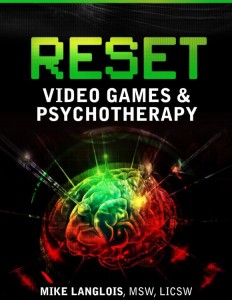?
?

Cover of Langlois? book
?
Feeling guilty about giving your child a video game for a holiday gift?
You shouldn?t, said Michael Langlois, a National Association of Social Workers member who has a private practice in Cambridge, Mass. and online.
Video games might actually be a very good thing, Langlois says.
Langlois? way of thinking runs counter to some research and television shows, movies and news reports that portray video gaming as addictive and heavy gamers as antisocial loners who are prone to violence.
?I?m definitely in the growing minority that asks us to rethink video game addiction,? said Langlois, MSW, LICSW, who is a teaching associate in psychiatry at Harvard Medical School. ?I think we use the term addiction very fast and loose in our culture.?
Instead, Langlois said video games can be beneficial because they can foster literacy in young people and teach important lessons about morality and how to find meaning in the mundane. Video games also help people build connections and friendships with others because the Internet has allowed gamers to pit their skills against players from around the world.
Langlois has become an expert and consultant on online technologies, video games and psychotherapy. He writes a blog, Gamer Therapist, and is author of? the Tilt Magazine article ?Saving the Game: The Use of Gaming within Psychotherapy? and the book ?Reset: Video Games and Psychotherapy.?
Langlois was recently tapped to speak about his views on video games at the South by Southwest (SXSW) Conferences and Festivals, a gathering of experts and devotees of original music, independent films, and emerging technology. And the Al Jazeera news service wanted to interview him about his theories on video games.
?

Scene from World of Warcraft videogame.
Video games key part of American culture
Video games are here to stay and have moved from game consoles,? television sets and desktop computers to smartphones and tablets.
Ninety-seven percent of American teenagers play video games as well as more than half of adults, regardless of race or income, Langlois said.
Since the use of video games is so widespread and so engrained in our culture the technology should be used in social work practice, he said.
Langlois wrote, ?Our profession has passed the point where learning about technology is negotiable. Meeting our clients where they are now means understanding technology.?
Conversation with Iraq soldier changed Langlois perception toward gaming
Langlois, who earned a master?s degree in social work from Smith College, played the original Atari 2600 as teen and the Nintendo 64 in college. As an adult he began playing World of Warcraft, a role-playing online game that allowed far more social interaction than earlier games from the 1980s.

Michael Langlois, MSW, LICSW
He became interested in video games from a clinicians perspective when he was playing Ultima online and began chatting with a player who was a soldier stationed in Iraq.
The soldier told him he was playing online to pass the time and have some social contact while in the middle of a war zone.
?We were running around and killing and being killed and resurrected (in the video game),? Langlois said. ?But he was in a real situation where he could actually die. And a lot of active duty people play and stay in contact with family and friends through videogames.?
So Langlois began to ask people what kind of video games they liked and why they played. And when a parent or spouse or partner came his practice complaining their child or mate played video games too much Langlois began to try to find out why that person found the game so meaningful.
Video gaming before school is good?
Langlois found that playing video games may not be an addiction but a replacement for what the client may be missing in their lives. And he cites studies that show that playing the games ? at least up to a certain point ? can be a good thing.
?A military study showed that playing 3 ? to four hours a day was a good way of psychosocial coping,? he said. ?However, after four hours (video gaming) becomes more a stressor and less a coping mechanism.?
Is your child shy in school? Langlois said there are studies that show if you let your offspring play a role-playing game where they portray a powerful or strong character for 90 seconds that feeling of confidence can last for six hours.
So contrary to popular wisdom, letting your child play video games for a few minutes before school may not be a bad idea, he said.
Langlois is now devoted to helping social workers and other mental healthcare providers understand what video gaming and new technology such as social media mean in their practice.
For instance, are they a help or hindrance when it comes to helping adolescents and their families?What happens when clients follow social workers on Twitter? And how can social workers protect patients? privacy rights?
Although video game use is now common social workers and others have not realized how significant they can be, he said.
?Video games used to be for geeks or people without social lives,? Langlois said. ?Now that video games are more cool and everybody is playing them we don?t think about them as much.?
SocialWorkersSpeak.org in 2011 reached out to the makers of the popular Sims computer game to help change the way social workers were portrayed. You can read more about that meeting. Social workers also help clients from all facets of society. To learn more visit the National Association of Social Workers? ?Help Starts Here? website.
today show powerball katt williams greg mcelroy new york post kate middleton bob costas
No comments:
Post a Comment
Note: Only a member of this blog may post a comment.